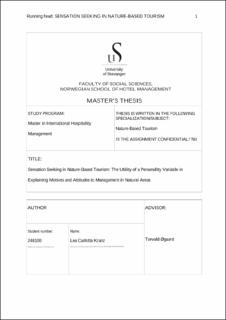| dc.contributor.advisor | Øgaard, Torvald | |
| dc.contributor.author | Kranz, Lea Carlotta | |
| dc.coverage.spatial | Norway | en_US |
| dc.date.accessioned | 2020-09-21T08:39:03Z | |
| dc.date.available | 2020-09-21T08:39:03Z | |
| dc.date.issued | 2020-06 | |
| dc.identifier.uri | https://hdl.handle.net/11250/2678689 | |
| dc.description | Master's thesis in International hospitality management | en_US |
| dc.description.abstract | Natural area managers are facing challenges to combine increasing visitation as nature-based tourism is growing with the protection of the natural resources. This thesis therefore aimed at contributing to solve this empirical problem through advancing the understanding of visitors to natural areas with the help of the personality variable sensation seeking, which despite its potential in tourism research has been applied only limitedly in the context of natural areas. Specifically, the conceptual model of the thesis examined the relationship between sensation seeking, measured by the Brief Sensation Seeking Scale (BSSS), and the motives to visit natural areas and the attitudes to natural area management, which were partly derived from Galloway and Lopez (1999) and extended with findings from other studies on nature-based tourism. To test the model a quantitative research design in form of a survey with a convenience sample of respondents approached at a natural area near the Norwegian city of Stavanger was conducted. Based on the analysis with responses from 151 participants, statistically significant positive relationships between the sensation seeking score and the physical motive of preference for stimulating and/or challenging activities, the wildlife motive of actively seeking wildlife, the focus on self motive of having time to reflect on life and the preference for eating in untouched areas as part of the management of facilities, as well as a statistically significant negative correlation between sensation seeking and the wildlife motive of avoiding potentially dangerous animals were found. Consequently, there was a limited number of significant relationships, which might result from the limitations of the study, including the analysis on the item level. Nevertheless, the thesis provided potential points of departure for further research in the context of natural areas and found support for the reliability and validity of the BSSS measuring sensation seeking. In addition, implications for the management of natural areas were derived. | en_US |
| dc.language.iso | eng | en_US |
| dc.publisher | University of Stavanger, Norway | en_US |
| dc.relation.ispartofseries | Masteroppgave/UIS-SV-NHS/2020; | |
| dc.rights | Navngivelse 4.0 Internasjonal | * |
| dc.rights.uri | http://creativecommons.org/licenses/by/4.0/deed.no | * |
| dc.subject | hotelladministrasjon | en_US |
| dc.subject | reiselivsadministrasjon | en_US |
| dc.subject | sensation seeking | en_US |
| dc.subject | nature-based tourism | en_US |
| dc.subject | outdoor recreation | en_US |
| dc.subject | natural area management | en_US |
| dc.subject | sustainability | en_US |
| dc.subject | motives | en_US |
| dc.subject | attitudes | en_US |
| dc.subject | turisme | en_US |
| dc.subject | bærekraft | en_US |
| dc.title | Sensation Seeking in Nature-Based Tourism: The Utility of a Personality Variable in Explaining Motives and Attitudes to Management in Natural Areas | en_US |
| dc.type | Master thesis | en_US |
| dc.subject.nsi | VDP::Social science: 200::Economics: 210::Business: 213 | en_US |

